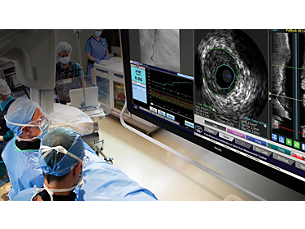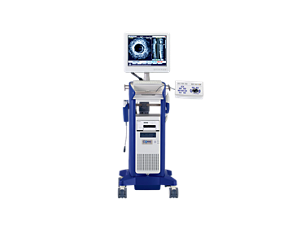- The only IVUS-guided re-entry device
-
The only IVUS-guided re-entry device
The Pioneer Plus catheter is the only re-entry device with IVUS and ChromaFlo. - Identify the true lumen with speed and precision
-
Identify the true lumen with speed and precision
Individual experiences with Pioneer Plus have demonstrated procedure time for effective re-entry ranging from 6-10 minutes.¹ - Visualise success with confidence
-
Visualise success with confidence
The Pioneer Plus catheter has demonstrated a 95% to 100% procedural success rate in subintimal angioplasty procedures.² - Minimise procedural complications
-
Minimise procedural complications
The guidance and direction provided by on-board IVUS imaging has the potential to minimise procedural complications.³ - IVUS helps with disease assessment
-
IVUS helps with disease assessment
IVUS imaging helps physicians assess disease markers including plaque burden percentage, lesion location and morphology, calcium volume, and the presence of thrombus. It also provides analysis of crucial parameters – like luminal cross-sectional measurements – and helps aid in disease diagnosis. - IVUS helps confirm treatment results
-
IVUS helps confirm treatment results
IVUS imaging helps to confirm treatment results, including the completeness of treatment, the apposition and expansion of stent placement, and whether or not the patient requires a thrombolytic drip. ChromaFlo imaging, for example, can be used to show evidence of stent apposition by illustration the absence of flow.
The only IVUS-guided re-entry device
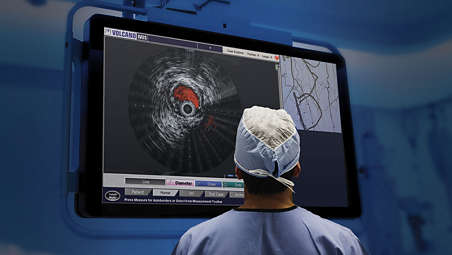
The only IVUS-guided re-entry device

The only IVUS-guided re-entry device
Identify the true lumen with speed and precision
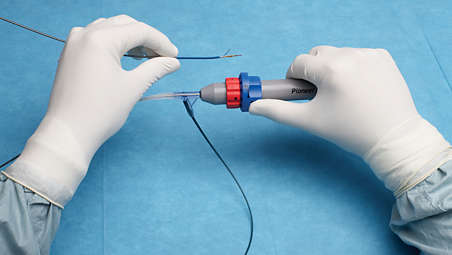
Identify the true lumen with speed and precision

Identify the true lumen with speed and precision
Visualise success with confidence
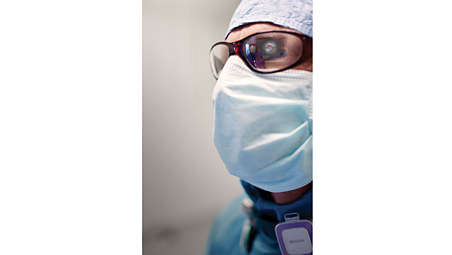
Visualise success with confidence

Visualise success with confidence
Minimise procedural complications
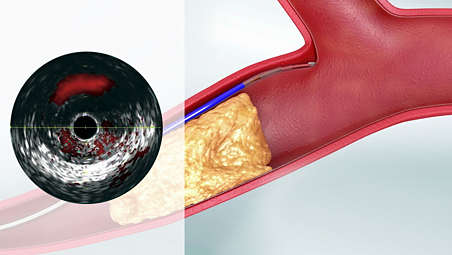
Minimise procedural complications

Minimise procedural complications
IVUS helps with disease assessment
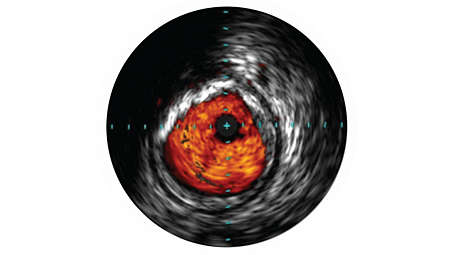
IVUS helps with disease assessment

IVUS helps with disease assessment
IVUS helps confirm treatment results
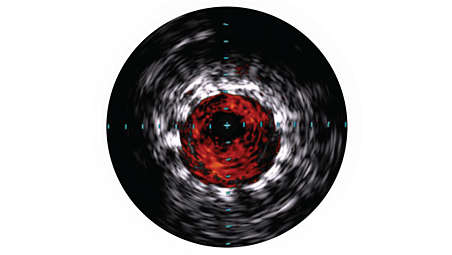
IVUS helps confirm treatment results

IVUS helps confirm treatment results
- The only IVUS-guided re-entry device
- Identify the true lumen with speed and precision
- Visualise success with confidence
- Minimise procedural complications
- The only IVUS-guided re-entry device
-
The only IVUS-guided re-entry device
The Pioneer Plus catheter is the only re-entry device with IVUS and ChromaFlo. - Identify the true lumen with speed and precision
-
Identify the true lumen with speed and precision
Individual experiences with Pioneer Plus have demonstrated procedure time for effective re-entry ranging from 6-10 minutes.¹ - Visualise success with confidence
-
Visualise success with confidence
The Pioneer Plus catheter has demonstrated a 95% to 100% procedural success rate in subintimal angioplasty procedures.² - Minimise procedural complications
-
Minimise procedural complications
The guidance and direction provided by on-board IVUS imaging has the potential to minimise procedural complications.³ - IVUS helps with disease assessment
-
IVUS helps with disease assessment
IVUS imaging helps physicians assess disease markers including plaque burden percentage, lesion location and morphology, calcium volume, and the presence of thrombus. It also provides analysis of crucial parameters – like luminal cross-sectional measurements – and helps aid in disease diagnosis. - IVUS helps confirm treatment results
-
IVUS helps confirm treatment results
IVUS imaging helps to confirm treatment results, including the completeness of treatment, the apposition and expansion of stent placement, and whether or not the patient requires a thrombolytic drip. ChromaFlo imaging, for example, can be used to show evidence of stent apposition by illustration the absence of flow.
The only IVUS-guided re-entry device

The only IVUS-guided re-entry device

The only IVUS-guided re-entry device
Identify the true lumen with speed and precision

Identify the true lumen with speed and precision

Identify the true lumen with speed and precision
Visualise success with confidence

Visualise success with confidence

Visualise success with confidence
Minimise procedural complications

Minimise procedural complications

Minimise procedural complications
IVUS helps with disease assessment

IVUS helps with disease assessment

IVUS helps with disease assessment
IVUS helps confirm treatment results

IVUS helps confirm treatment results

IVUS helps confirm treatment results
Documentation
-
Brochure (2)
-
Brochure
- Pioneer Plus quick reference guide (1.5 MB)
- Pioneer Plus product brochure (1.9 MB)
-
Brochure (2)
-
Brochure
- Pioneer Plus quick reference guide (1.5 MB)
-
Brochure (2)
-
Brochure
- Pioneer Plus quick reference guide (1.5 MB)
- Pioneer Plus product brochure (1.9 MB)
Specifications
- Catheter size specs
-
Catheter size specs Frequency - 20 MHz
Sheath compatibility - 6F (0.087", 2.2 mm)
Tracking guide wire - 0.014”
Needle guide wire - 0.014”
Working length - 120 cm
Needle depth - 3 mm, 5 mm, and 7 mm
Ordering info - PPLUS120
Needle size - 24G
-
- Catheter size specs
-
Catheter size specs Frequency - 20 MHz
Sheath compatibility - 6F (0.087", 2.2 mm)
-
- Catheter size specs
-
Catheter size specs Frequency - 20 MHz
Sheath compatibility - 6F (0.087", 2.2 mm)
Tracking guide wire - 0.014”
Needle guide wire - 0.014”
Working length - 120 cm
Needle depth - 3 mm, 5 mm, and 7 mm
Ordering info - PPLUS120
Needle size - 24G
-
Related products
Alternative products
-
Core
- Choice of FFR, iFR, and IVUS modalities on a single integrated platform
- Delivers convenience in your workflow with true integration
- Always on and ready for use when you need it
View product
-
Core Mobile
- Choice of FFR, iFR, and IVUS modalities on a single mobile platform
- Delivers convenience by offering flexibility to service multiple rooms
- Offers an intuitive interface for optimal ease of use
View product
-
Core
The Core precision guided therapy systems offer the choice of imaging and physiology on a single integrated platform.¹ Core helps provide clarity in your approach, confidence in your decisions, and convenience in your diagnostic and interventional workflows.
View product
-
Core Mobile
Core Mobile is designed to power the future of precision guided therapy and offers the choice of imaging and physiology on a single mobile platform.¹ Core Mobile also provides clarity in your approach and confidence in your results by offering additional information during the diagnostic phase, assisting in intervention decisions.
View product
- 1. Saket R., Razavi, M., Padidar A., et al. Novel Intravasular Ultrasound-Guided Methods to Create Transintimal Arterial Communications: Initial Experience in Peripheral Occlusive Disease and Aortic Dissection. J Endovasc Ther. 2004; 11: 274-280.
- 2. Al-Ameri, H et al. Peripheral Chronic Total Occlusions Treated with Subintimal Angioplasty and a True Lumen Re-Entry Device. Journal of Invasive Cardiology. 2009; 21(9): 468-472.
- 3. Saketkhoo RR, Razavi MK, Padidar A, Kee ST, Sze DY, Dake MD. Percutaneous bypass: subintimal recanalization of peripheral occlusive disease with IVUS guided lumen re-entry. Tech Vasc Interv Radiol. 2004; 7: 23-27.
